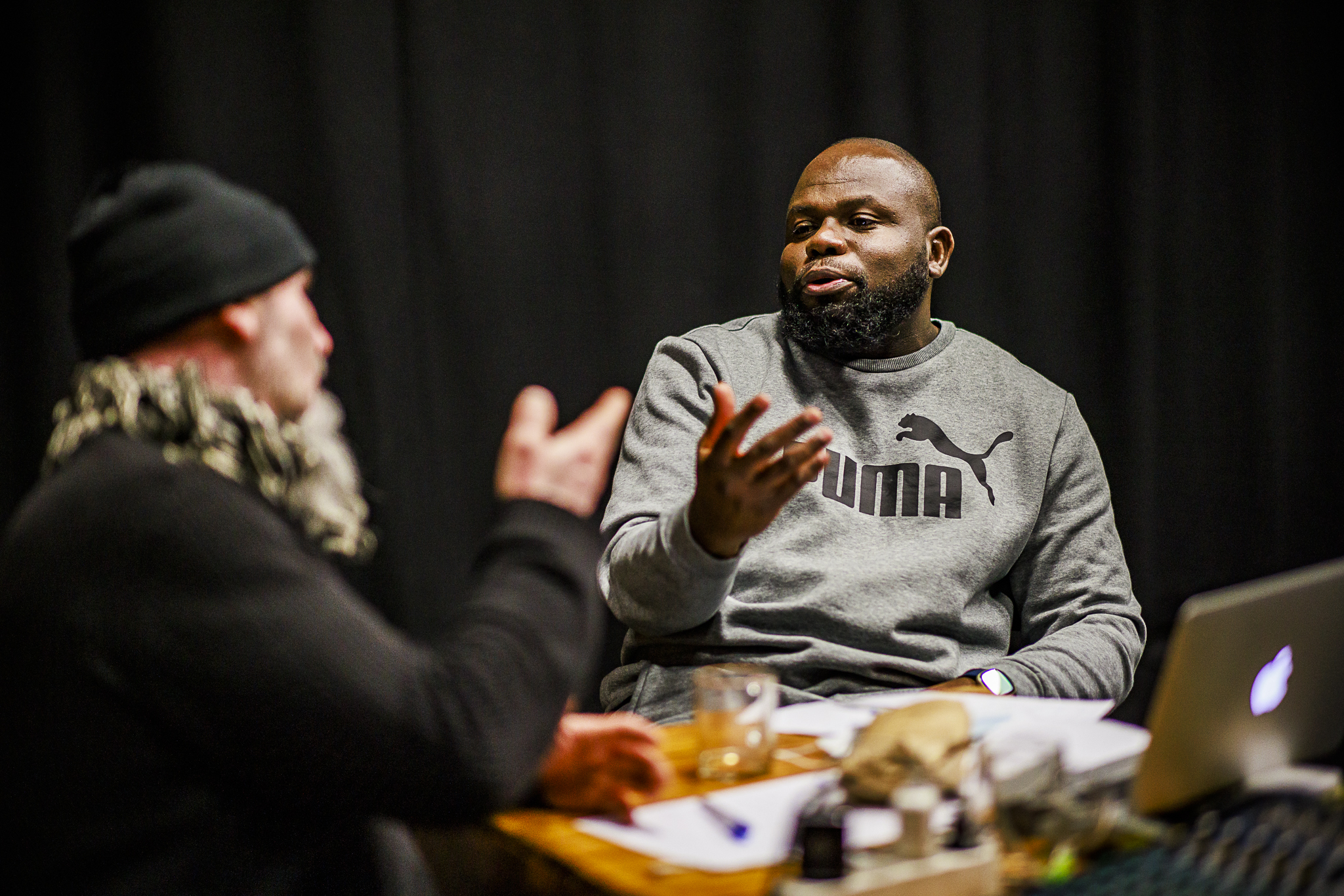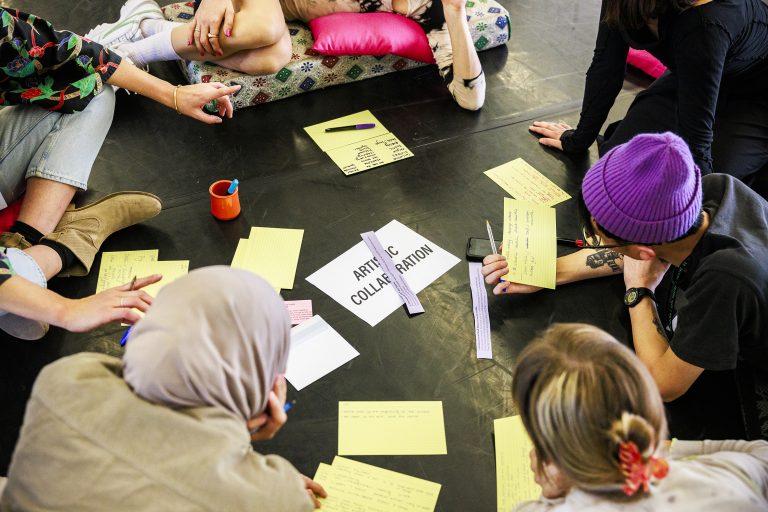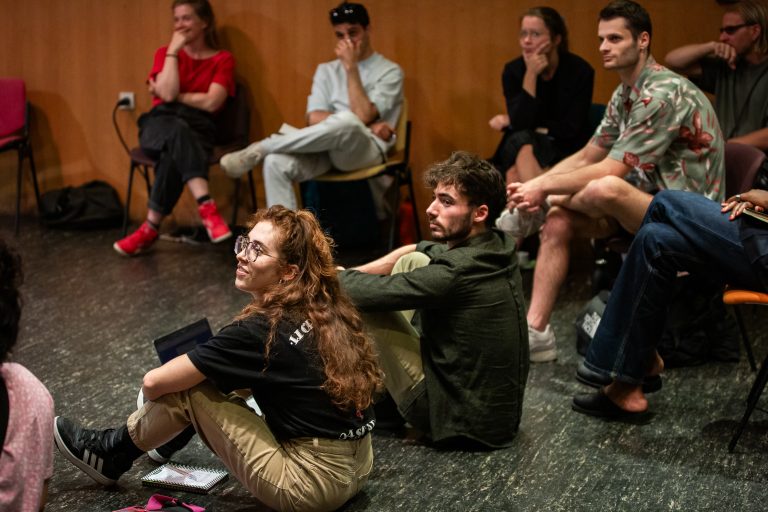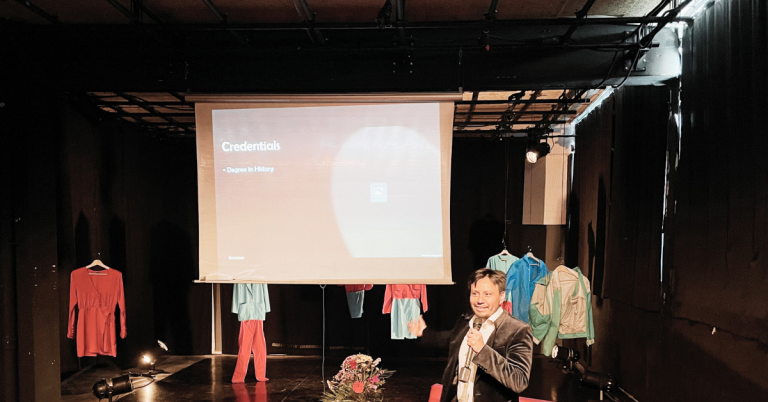Artistic multi-talent Junior Akwety talks about his MAP residency and ongoing projects. Junior Akwety not only earned his stripes as a successful rapper, producer and performer, he also has several stage productions of his own in the scaffolding. Though he doesn’t consciously seek the spotlight. “My greatest passion remains building bridges between people,” he said.

WIPCOOP Junior Akwety
Nay, he is not the only artist skilled in various disciplines. But anyone looking at Junior Akwety’s career cannot help but conclude that he is very versatile. The Kinshasa-born Antwerp native is a rapper, singer-songwriter, producer, house musician, performer and playwright. He worked with such ringing names as Silvy De Bie, Leki and Sandrine, and with labels such as Universal, Sony and Warner. Akwety toured the US as a musician, founded his own record label, starred in performances by Junior Mthombeni and next season he will be one of the faces of KVS with a project on Rumba, among other things.
“Although I think connecting people is ultimately my greatest talent.” Akwety says it modestly when we meet in Antwerp. Despite his impressive resume, he has both feet on the ground. The young father has a busy morning rush on his hands and is happy to sink in with a coffee. “I don’t necessarily need a spotlight,” he smiles. “I equally enjoy facilitating other people and figuring out how to best express their talent. Moreover, don’t be blinded by the projects that are to my name. I had to work in the hospitality industry and at Cotton Nation for a long time as well because I only had project-based income as an artist. I have only really been able to make a living from my artistic projects since 2016, and even then it is sometimes searching.”
Although that does not take away from the fact that Akwety’s track record is at least impressive. At 20, he moved to Belgium from the Congo to study. “My father was a diplomat so I was used to settling in new places. As a child, I lived in Morocco, France and London, among other places. Still, that move to Belgium meant a culture shock. I thought beforehand that Flemish was a French dialect so that was pretty disappointing,” he grins. I spent the first year I lived here working really hard to learn the language because I absolutely wanted to be able to communicate.” After that, Akwety initially began studying physical therapy before rolling into music.
“However, that was not necessarily written in the stars,” he says. “In Kinshasa, music and rhythm were part of daily life, and I sang in a choir, but I was not performing in front of an audience there, for example. So I wasn’t classically trained either. In my student days on the Left Bank, I formed the hip-hop collective Muzoba with others, and from there the ball got rolling.”
His broad interests led Akwety to many different disciplines. “I found it super exciting to end up in the performing arts through music. In 2012 I worked with Junior Mthombeni in MAP’s (then Mestizo Arts Festival) Studio Urbanization and in 2013 I was asked by Sincollective to participate in Rumble in da Jungle. Since then, I have continued to participate in performances by Junior Mthombeni. Think Malcolm X or L’homme de la mancha, Drarrie in the night and Who’s Tupac. It is so instructive to see a professional like Junior at work. Thanks to him, I have learned to analyze how a performance is put together, what the role of a director can be or what a dramaturg is. At the same time, I am also fascinated by all the practical work: how the art world works, how to apply for funds and so on.”
MAP residence
Meanwhile, Akwety is fully engaged in his own stage projects, and they are as multifaceted as the rest of his career. This was evident again during his residency at MAP. Not coincidentally, he used his time to explore no fewer than three projects instead of one. “I am very happy that at MAP they did not react negatively to the fact that I wanted to use my residency to tinker with different projects. I realize that’s unusual but I needed a safe space to try out all kinds of things and that’s exactly what I was able to do during my residency.” That approach proved fruitful. Akwety experimented with different genres and invited a variety of creators and experts to join the conversation. This allowed all three projects to take flight. Enthusiastically, he explains them while sipping his coffee.
“The first performance I wanted to continue working on is My House. In it, together with dancer Zach Swagga, I bring an ode to house music. Together we dive into the history, influences and culture of that music. I always say that house saved my career. I was sometimes tired of the much harder hip-hop world where I had to sell myself over and over again. When I discovered house, a whole other world opened up for me. It’s a warm community and I was welcomed there with open arms. I can still be 200% myself there. During the residency, we brainstormed what house means and developed different dramaturgical avenues to see how best to tell our story.”
The second project Akwety worked on is ROOTS IN ROUTES “Rumba intercontinental.” That performance is an examination of the Rumba and communities around the musical style.” he says. “With L’Homme de la mancha, we toured South America. There I discovered that there are links between Congolese and Cuban Rumba. Black slaves brought their culture with them there, but there were equally South American influences coming back to the Congo. Those links intrigue me greatly. During the residency, we worked with an expert from Tervuren on ethnic and African rhythms. We investigated which social stories had an influence on those rhythms and what, for example, the countries’ independence meant for the Rumba. Together with musicians Enrique Noviello and Yodi Omankoy, I am now working further on the performance.”
Akwety’s third project is called Neighbors and is a participatory workshop series around theater with and for young people along with Aïcha Cissé and Nabil Mallat as coaches. “Through that trajectory, we will work with young people from neighborhoods like Kiel and Borgerhout and Merksem. I want to give them a taste of theater. It is sometimes difficult to reach those young people. Especially in covid times, the contact of many young people did not go beyond the very limited circle of their own family or neighbors. If you already have few opportunities, this only makes your world even smaller and prevents you from discovering your own potential. Within this project, we therefore want to awaken their interest in theater, offer them insight into the medium but above all tap into their talent. We invite them in a very accessible way to tell their own story and guide them from there to give it dramaturgical form. This can also be done through videotaping or social media. Then we see if we can come up with a performance. We have meanwhile had a first show moment at CC Nova with partners such as youth operations Jes and Kras and that was already promising.”
Married to house
His Rumba trajectory will continue in KVS for the next few years, for the house project it is a matter of finding partners, co-producers and resources. “That’s the reality of the industry huh,” says Akwety. “I want to be able to pay the people I work with solidly and then you don’t get there with five thousand euros. So I am in talks with several houses and will also submit a project file.”
Akwety is fascinated by the economic realities behind the arts. Although sometimes it also means a struggle. “Requesting projects, preparing budgets and looking for partners: these things require a lot of energy that you cannot invest in the creative process. It is not easy to be both creative and to manage a project and to make sure that everything works financially. Before you know it, you forget that art begins with the creative. You have to take the space to give artistic shape to your story. The essence is to know what you want to tell, only then can you start thinking about all the practicalities. That is also what stuck with me after my residency: I was able to focus the content of my projects there. It helps me that I now know exactly what I want to say before I approach people.”
When we ask him if he actually prefers hip-hop or house, Akwety laughs. “I’m married to house and hip-hop is my mistress. I don’t happen to see MY HOUSE as a love project. I want to transfer to the audience the freedom, but also the passion and the emotions I feel there. Hip-hop, in turn, represents dynamism and struggle. My best friends still come from the hip-hop scene but it is a world where you always have to fight for your place. With L.O. Squad we always attracted a lot of people when we did concerts but we didn’t get played on the radio. We were a vibrant young group but no label came to us to help us and then you get frustrated. You don’t see a place for yourself in the world. That’s hip-hop too: keep going and bumping into walls. That’s been in it from the very beginning. That music didn’t arise by chance in difficult neighborhoods. So I see hip-hop as a form of positive violence to channel your energy. House, on the other hand, is all about positivity and openness. When I didn’t know that scene I associated house with techno and white people, but in the U.S. I saw something completely different. I discovered that house music had its origins in African-American culture and that it was still alive and well in communities. There were people active there from very diverse backgrounds. I still love seeing that.”
It is an inclusiveness that Akwety would prefer to see everywhere in society. Hence, Neighbors is at least as important to him as his other projects. “It is so important that we as professionals go back to the neighborhoods we come from to connect with who lives there. Besides, everything starts with the youth, if you don’t listen to them, you lose a piece of yourself. Someone like Saïd Boumazoughe thinks exactly the same way. We want to be a bridge for young people with talent. I want to use the opportunities I was given to show them what options there are in the world and give them a platform to break out.”
Akwety finds the fact that the arts sector is still so white problematic. “When you see the management of KMSKA you have the feeling that there is no place for you there as a person of color. Personally, I think we can only change that by continuing the conversation and thus ensuring that your voice is eventually heard. Fortunately you can see that in Brussels there is a lot of movement in that area, now Antwerp has to follow suit. And we are here to work with them hehe. There is still too little structure and platform here for talent to flow through. If you want the arts to stay alive, it is necessary that new artists have a place next to talent that has already made it. That dynamic between experienced rottenness and young awesomeness is vital.”
It is the common thread throughout the conversation: Akwety insists on the importance of building bridges, starting conversations and making space. “Bringing people together is what I love the most. I also think that’s where my ultimate future lies. Perhaps I got that from my father. I love to create, but even more than necessarily having to be an artist myself, I am the diplomat who connects everyone.”
By Ciska Hoet.


